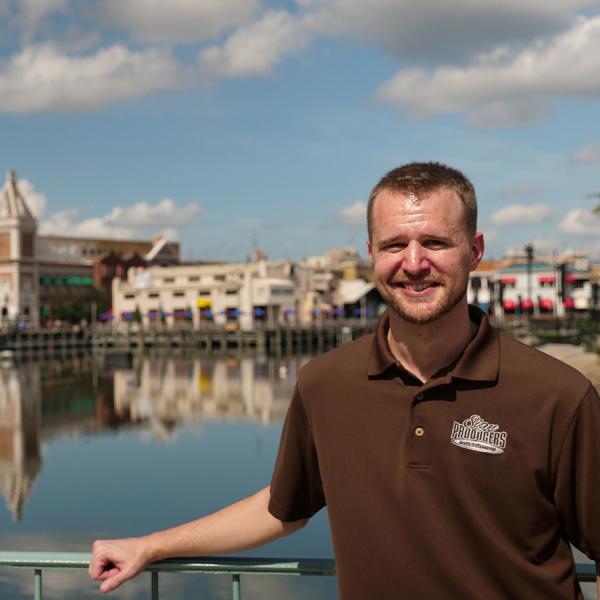"I never felt like I had homework assignments, because when you're there, you're doing what it is you want to be doing. Everything was always inventing something, creating something, doing some type of study. I'm not going to learn things just by sitting and filling out a worksheet. I'm going to learn by going out and doing it."
Cory Karges
- Alumni
- Engineering & Industrial Design Technology
He dabbled in IT and was actually pretty good at it. But that wasn’t his passion. It felt too much like work. Now Cory is imagining and creating signs for admired names like Universal Studios. You could say he’s in his element. In fact, he doesn’t consider his nine-to-five a job. He calls it a playground.

Guaranteed Momentum
Work is a thrill ride
Cory always wanted to “make stuff.” He’s accomplished that goal, thanks in part to his bachelor’s degree in industrial design from Pennsylvania College of Technology. The 2014 Penn College graduate is the design manager at Sign Producers, a custom designer, builder and installer of signs for Universal, Disney and other entertainment venues throughout the world.
TAKING THE LEAD
Q&A with Corey
WHAT IS INDUSTRIAL DESIGN?
Industrial design is the discovery of a product or a service that appeases some type of want or need for an end user. It doesn't always have to be a product. Sometimes it's a service. It's really a mindset that you have. It could be anything from user experience, which could be a website and how someone interacts with their computer to how you interact with a product. It's a process. It's not the end goal.
HOW WOULD YOU EXPLAIN WHAT YOU DO?
I make things that are highly interactive with an end user, whoever that might be. It's really finding that integration along the way. Everything is design. So everything that I do is thought about, every aspect. Everything has some purpose. It's laid out that way for a reason.
HOW DID YOU COME TO STUDY INDUSTRIAL DESIGN?
I started in community college and was in computer science. And I was really good at it, but I really hated it. It wasn't fun. When I got done with something, I was happy that it was done and it was over with. So I took a year off and I went into panic mode, like, “What am I going to do with my life? I'm 19 years old, I have to know.” And I did a lot of research, and realized that probably the best advice I got was, “Find the thing that you're really good at and that you really enjoy doing and then find a way to make money doing it, and then you'll never work a day in your life.” So I remember sitting there going, “What should I do? What should I do?” I was always taking things apart and putting them back together. Never the way that they were in the first place, it would always be something new.
WHEN DID YOUR INTEREST IN DESIGN BEGIN?
I had hot glue gun burns on my hands when I was five years old. I thought, “Well, I want to make cell phones.” This is when cell phones had just turned from flip phones to iPhones and I'm like, “I want to do that.” And I go, “Well, somebody does that. There's a guy that does that.” I thought, “I want to be that guy. I don't know what his title is, but that's what I want to do.” And then I started researching it and I found out, “Oh, there's these industrial designers and these product designers,” and then I can filter in deeper and say, “Okay, I want to work on consumer electronics, and then I want to work on cell phones,” and then it led to, “All right, I'm going to go back to community college. I'm going to take all the classes that I need to take now and then transfer to a college that does industrial design.”
HOW DID YOU KNOW YOU WOULD BE GOOD AT INDUSTRIAL DESIGN?
I didn't care to be quite honest. I wanted to make stuff. I wanted to figure things out. It's what I had always done. If you have a passion for something, you go for it, and you're going to get good at it or else you'll find something else. You're not ever going to find yourself good at something the first day you try it.
HOW DID YOU END UP AT PENN COLLEGE?
WAS THE TRANSFERRING PROCESS PRETTY EASY?
They actually allowed me to transfer a lot of things I didn't expect them to because I was one of our trailblazers since the major was new at the time. They would take certain classes and say, “Okay, we'll let you have this,” because it makes sense for what I want to do. What I wanted to do wasn't traditional for what everybody else in my major did because industrial design is so big. There's so many different branches that you can go into. Who'd think that signage would be a part of that? But yeah, they were really accommodating.
DID YOU FEEL WELCOMED AS A TRANSFER STUDENT?
I did. It was probably having the right people at the beginning. My major was very small, so everybody knows everybody real fast. You spend every day together. Those are the people who you hang out with. But Penn College is small enough where you get to know everybody that's there, to the point where you always know somebody and you're never alone.
WERE YOU INVOLVED IN CLUBS?
Yes. I was the president for our first year with The Society of Inventors and Mad Scientists, which was cool. We turned it into a fun competition. It was also something that would help us as a design aid, where people would learn the design process and learn design thinking and exploring things that they wouldn't explore if they were sitting in their own box. We're bouncing ideas off of each other.
CAN YOU TALK ABOUT THE LAB EXPERIENCE VS LECTURE?
WHAT'S THE TOP THING THAT STANDS OUT TO YOU ABOUT YOUR PENN COLLEGE EDUCATION?
I was allowed to tailor my education to wherever I thought that I was going to go with it. I wanted to take a polymer processing class. I wanted to learn how plastic products were made. It wasn't really part of the curriculum and wasn't really a suggested elective. It was never a, “No, you can't do that,” which I had heard before at other colleges. Where instead it was, “Absolutely. Would you mind making a list of all the things that you think would apply to your degree so that we can add them to what is recommended?” I'm like, “Of course.” So we took that. I think I got all my classmates into a woodworking class, for instance, where we made furniture.
WAS THE FACULTY INTERACTION A DISTINGUISHING FACTOR?
Absolutely. The small classes are probably the best because you are a part of whatever's going on. You're not in a big lecture hall just listening to somebody talk and filling out the absentee thing if you're not there or whatever. Having that individual attention and them being able to tailor what you need to learn based on that was really cool. I've had several professors that would say, “Okay, we haven't done so great in this one aspect. We're going to spend more time on it, we're going to spend less on the other.”
Programs
Engineering & Industrial Design Technology
The Industrial Design program, you’ll explore functionality, ergonomics, and aesthetics. Learn how to express concepts using rendering software.
All Programs
Unsure which major is right for you? See all academic programs at-a-glance.


